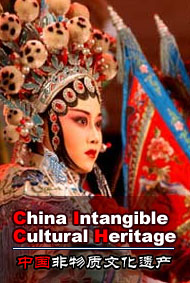
| Heritage Home | ||
| Literature | ||
| Music | ||
| Dance | ||
| Drama | ||
| Quyi | ||
| Acrobatics/Sports | ||
| Fine Arts | ||
| Crafts | ||
| TCM | ||
| Custom | ||
|
|
|
Husa Knife Making of the Achang Ethnic Group
Year: 2006 "Husa Knife," a long-famed handicraft of the Achang ethnic group, gets its name because the Achang mainly inhabit Husa Town of Longchuan County in Southwest China's Yunnan Province. This sort of knife is well-forged and elaborately made, and very sharp, tensile, durable. Sheaths made of wood, leather, silver and other materials are extremely exquisite, too. Achang Knife varies in length and shape. There are more than ten sorts of knives for their own use. For instance, there are knives for daily use, long swords for hunting and self-protection, and daggers for butchering domestic animals, and the like. Due to its exquisite smith work, Achang Knife is not only cherished as an ethical legacy of the Achangs, but also favored by other neighboring ethnic groups like Dai, Jingpo, Tibetan, and Bai. Not confined to the local area however, Achang Knife has been sold across the county and even exported overseas. The Achang ethnic group has an over-six-hundred-year history of making knives and other cutting tools. It's said that a branch of military soldiers among the Ming army that stationed in the Husa Town boasted fairly good smith work and they were assigned to the task of making weapons. These men married with the local girls and gradually merged into them. The Achang inherited and developed the Ming army's art of smelting and forging, and came to produce many knives with their ethical characteristics. Their techniques have become more exquisite. They have a relatively specific division of labor among villages, and every village has its own products of fame. Husa Knife is sharp and durable because it will be finally done after a complicated process consisting of up to ten steps, such as selecting choice materials, drawing a design, making moulds, smelting, filing, quenching, polishing, and the like. It's worth noting that the Achangs have very fine skills in quenching and hardening steel, and their knives are carefully and beautifully filed. Some aged craftsmen can even make knives that are both firm and foldable, of which some can be curled up at one's will. For example, a long sword, when not in use, can be curled around the waist like a girdle, and, when needed, it can be stretched forward immediately. However, the skill of forging Husa Knife is in danger of being lost due to the aging of practitioners and lack of young successors in the local area. With the advent of technological bangs, this traditional handicraft gradually gives way to mechanization and mass production. Therefore, more protections are necessary to prevent this art form from extinction. |